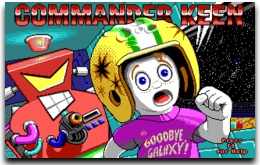Nintendo is seeing some great successes with their console — duh. What is the best way to provide evidence that Nintendo has a hit with their new little white console? Perhaps the bright blue eyes of id Software? Originally, it was said that id Software wasn’t really interested in developing games for the Wii, perhaps because it goes against all that id Software has developed their company towards since 1991?
 id Software has always leaned toward bleeding edge content, pushing hardware to its limits and utilizing technology that has just hit the market. Nobody is surprised when they’re forced to upgrade their computers to play the latest id Software creation to its fullest extent. This is the price for being top dog in graphic engines, but now they’re changing their tune a bit.
id Software has always leaned toward bleeding edge content, pushing hardware to its limits and utilizing technology that has just hit the market. Nobody is surprised when they’re forced to upgrade their computers to play the latest id Software creation to its fullest extent. This is the price for being top dog in graphic engines, but now they’re changing their tune a bit.
Okay, it has to be said, is id Software contemplating a Wii game simply because of Nintendo’s success with the console? The core id Software audience isn’t grandma and grampa or the 10-year old kid next door. But, money talks. We’re not saying id Software is hurting for money although we’re not sure what keeps them floating given their last major title was yet another Quake game launched in 2005 with 2004’s DOOM 3 looking like an old man by now. Everyone is waiting on Rage which was announced in 2007 and still hasn’t been given a release date.
Perhaps id Software could use a little Wii to get their name back in the press, get bloggers talking and net them some fresh cash from a large pool of Wii owners looking for their next tennis game. Okay, nobody is going to believe they’d work on a silly Wii Sports clone but they’ve not announced, yet, what this “exclusive Wii” game will be. Carmack did say the Wii is “out of sync with the developments that are currently going on at id,” which suggests they’re going to be working on a new property or perhaps bring back an old property… Wolfenstein 3D, Commander Keen or maybe some Heretic action?
We’ll assume this upcoming id Software title won’t be 100% kid friendly even targeting a Wii platform. Are they going to develop a title for the Wii simply because they know it will be launched on a console with the largest install base in the world? Or, perhaps its a new found passion that Carmack has developed from sharing the Wii experience with his four-year old boy?
(Thanks, 1up)

 id Software has always leaned toward bleeding edge content, pushing hardware to its limits and utilizing technology that has just hit the market. Nobody is surprised when they’re forced to upgrade their computers to play the latest id Software creation to its fullest extent. This is the price for being top dog in graphic engines, but now they’re changing their tune a bit.
id Software has always leaned toward bleeding edge content, pushing hardware to its limits and utilizing technology that has just hit the market. Nobody is surprised when they’re forced to upgrade their computers to play the latest id Software creation to its fullest extent. This is the price for being top dog in graphic engines, but now they’re changing their tune a bit.
Wow, I wish I knew about the Kickstarter for Dark Souls! This podcast was the first I heard of it, so I checked it out and I’m amazed. It’s well worth the $120, and I know what I’ll be spending my birthday credit card on!